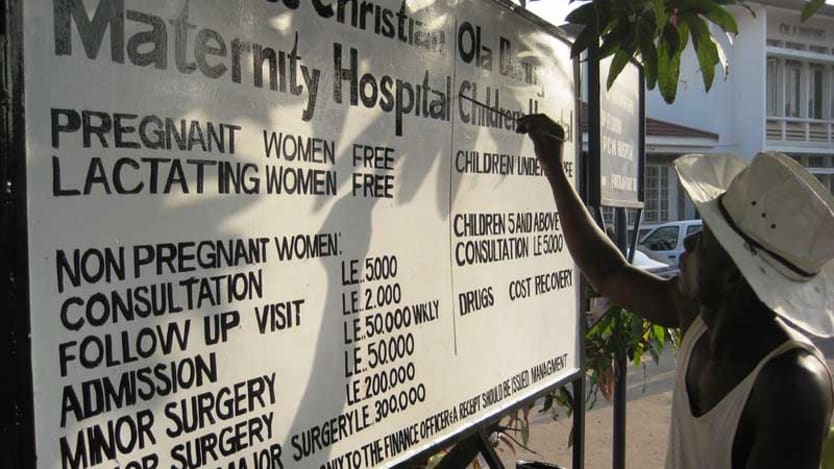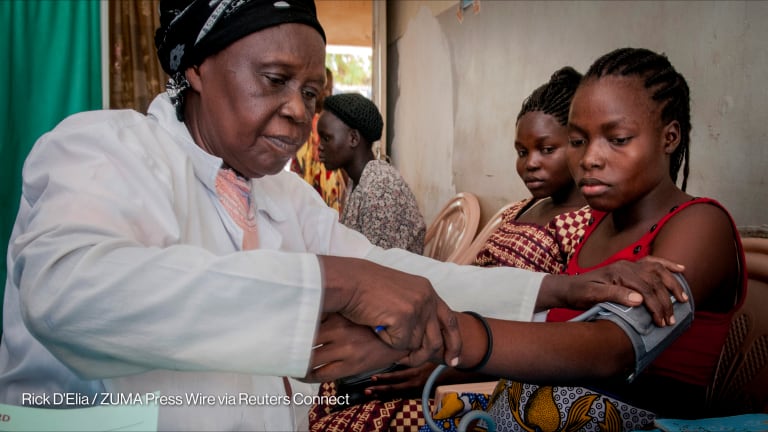Opinion: 4 priorities on women's health for new WHO chief Dr. Tedros Ghebreyesus

This article was updated with additional insight on the election.
Today, the race to head the global health agency charged with responding to pandemics and setting health policy has culminated with the selection of Dr. Tedros Adhanom Ghebreyesus. As next director-general of the World Health Organization, Tedros will take the helm as countries such as the United States are stepping up their efforts to roll back progress on women’s and girls’ sexual and reproductive health and rights.
The next WHO director-general is Tedros Adhanom Ghebreyesus
The former minister of health of Ethiopia was elected as the new leader of the U.N. global health body by the World Health Assembly on Tuesday.
In this context, it will take a particularly courageous leader to ensure that the world’s prominent health body does not let politics trump evidence. Instead, the WHO’s new leader must take the bold action needed to ensure that every woman and girl everywhere can exercise her right to control her body, protect her health and live a healthy, empowered life.
Here are four priorities for women and girls that should be at the top of Tedros’ agenda.
1. Support countries to expand access to safe, legal abortion
Unsafe abortion continues to be a major public health crisis, resulting in the deaths of about 50,000 women each year and injuring as many as 8 million more. The tragedy is that this crisis is completely avoidable: No woman should have to resort to unsafe, clandestine services for what is one of the safest medical interventions that exists when provided by trained health care workers. It is also a violation of women’s human rights.
For years, the WHO has provided unbiased guidance to countries on how to expand access to safe abortions through public health services. The next director-general must encourage governments not only to train and equip health care workers to provide safe abortion services, but also to address unsafe abortion as the human rights violation that it is, and tackle other barriers to safe abortion, such as legal and policy restrictions and stigma from health care workers and communities. In doing so, Tedros’ own experience from Ethiopia should be highlighted as a best practice: unsafe abortion went from the leading cause of maternal death to the fifth leading cause after liberalization of Ethiopia’s abortion law, contributing to a 71 percent drop in maternal deaths since 2000.
UNFPA assess extent and impact of US cuts
While the funding loss was expected, the Unites Nations' reproductive and sexual health agency is still grappling with how the cuts will play out across its various programs and work worldwide.
This leadership is particularly crucial at a time when the U.S. is trying to eliminate women’s access to safe abortion services domestically, and expanding risks abroad through policies such as the Global Gag Rule. Further, the WHO must not shy away from including safe abortion as an essential health service for women and girls in their technical guidance to country health authorities regarding adolescent health or the response to the Zika epidemic.
2. Recognize and respond to the Zika virus as the emergency for women that it still is
In November 2016, when the WHO declared that the Zika virus was no longer a public health emergency, the women on the frontlines of the Zika response considered this a premature claim to victory. In Brazil’s northeast, the epicenter of the crisis, women were still being infected, babies were still being born with microcephaly and other Zika-related complications, and the Brazilian government was still abdicating its responsibility to provide those affected by Zika with long-term care and support. Grupo Curumim and the ANIS-Institute of Bioethics feared that declaring an end to the crisis would mean fewer resources and less political will to tackle a virus that was continuing to have profound impacts on women and their families, not only in Brazil, but across the region.
Protecting women and children in Zika-affected countries
What urgent actions are critical for the well-being of women and children in Zika-affected countries? In this guest column Devex gets the inside track from three experts — Nancy Aossey, president and CEO of International Medical Corps; Save the Children USA's President and CEO Carolyn Miles; and Jonathan D. Quick of Management Sciences for Health.
Their fears rang true, when just this month the Brazilian government also declared the national emergency over, without addressing the underlying conditions that contributed to the Zika epidemic in the first place, and could pave the way for its return. Brazil has also yet to guarantee women and their children affected by Zika the care and support they need.
While the number of new cases of Zika has declined, as of April, the WHO classified 47 countries in the Americas, including the U.S., as experiencing ongoing transmission.
The newly elected WHO director-general must now take the lead in urging countries to address the structural and environmental factors that allow epidemics such as the Zika virus to flourish in the first place, as well as the disproportionate impacts they have on women and their children.
3. Be a champion for adolescent girls’ sexual and reproductive health and rights
Adolescent girls bear the consequences of governments’ recalcitrance to provide young people with the education and services they need to be able to protect their sexual and reproductive health. The WHO recently reported that complications from pregnancy, including unsafe abortions, remain the leading cause of death among girls aged 15 to 19. Suicide is next, with increasing evidence pointing to rigid gender norms, gender-based violence and adolescent girls’ inability to control their bodies and lives as a major reason why girls take their own lives. It does not have to be this way.
Just this month, the WHO released an important guidance to support countries to take evidence-based action to improve adolescents’ health. Chief among their recommendations is making sure that every young person has access to comprehensive sexuality education that addresses gender norms and power dynamics within relationships, and enables them to develop the skills they need to negotiate and take control over their sexual and reproductive lives. The guidance also urges governments to guarantee access to comprehensive sexual and reproductive health services, including contraception and safe abortion, and to prevent and respond to harmful practices such as child marriage and female genital mutilation.
It is clear that Tedros must become a relentless champion for the implementation of this guidance, and be willing to challenge the governments that use politics, religion and culture as an excuse for inaction.
4. Ensure that universal health coverage does not leave women and girls behind
In 2015, governments committed as part of the Sustainable Development Goals to achieve universal health coverage by 2030, including by making sure that no person is plunged into poverty because of illness or injury and that everyone has access to health services. This is critical. Yet, as I have written, universal health coverage alone is not likely to be enough to address women’s and girls’ sexual and reproductive health.
Margaret Chan, the WHO’s outgoing director-general, has been a particularly avid champion of universal health coverage. While Tedros has pledged to make this promise a reality, he must take leadership from the start to ensure that the drive toward universal health coverage does not leave women and girls behind. To do this, the WHO must issue guidance that helps countries design health coverage schemes that take a holistic approach to women’s and girls’ health, and address their specific sexual and reproductive health needs, take concrete action to reach those most marginalized, and tackle social, cultural and structural barriers to health.
For women and girls, a WHO director-general who prioritizes their health and human rights, allocates the necessary resources to address them and is a vocal champion on their behalf can make all the difference to their ability to survive and thrive. We call on the new director-general to step up to the challenge and put women and girls at the center of the WHO’s agenda.
Join the Devex community and access more in-depth analysis, breaking news and business advice — and a host of other services — on international development, humanitarian aid and global health.
Search for articles
Most Read
- 1
- 2
- 3
- 4
- 5








